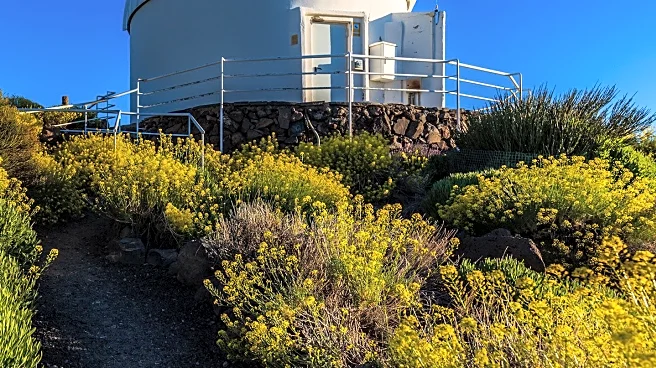What's Happening?
Sky & Telescope organized a 'Galileo's Italy' tour, bringing 25 astronomy enthusiasts to Rome to explore sites significant to Galileo's life and work. The tour included visits to landmarks such as the
Pantheon, Spanish Steps, and the Angelica Library, where participants viewed first editions of Galileo's works. The tour also featured visits to the Copernican Museum and the Vatican Observatory, showcasing Renaissance scientific instruments and historic telescopes. Participants experienced a total lunar eclipse from a rooftop restaurant, adding an astronomical highlight to the trip.
Why It's Important?
The tour highlights the enduring legacy of Galileo, the father of modern science, and his contributions to astronomy. It provides participants with a unique opportunity to engage with historical sites and artifacts, deepening their understanding of Galileo's impact on science. The tour also fosters appreciation for the intersection of art, history, and science, promoting cultural and educational tourism. By visiting these sites, participants gain insight into the historical context of scientific discoveries and the evolution of astronomy.
What's Next?
Sky & Telescope plans to continue offering similar tours, providing enthusiasts with opportunities to explore historical and scientific landmarks worldwide. The success of the 'Galileo's Italy' tour may inspire other organizations to develop educational travel experiences that combine science and history. Participants may share their experiences, potentially increasing interest in astronomy and historical tours. The tour's focus on Galileo's contributions may also encourage discussions on the importance of preserving scientific heritage.
Beyond the Headlines
The tour underscores the importance of preserving historical sites and artifacts related to scientific discoveries. It highlights the role of cultural tourism in promoting education and appreciation for science and history. The tour also reflects the growing interest in experiential learning, where participants engage directly with historical contexts and scientific concepts. By exploring Galileo's legacy, the tour fosters a deeper understanding of the historical development of scientific thought.








